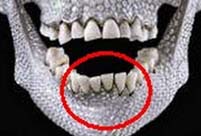 Amazing cliff diving in cold winter
Amazing cliff diving in cold winter
 Enjoy Sochi 2014 in slow motion
Enjoy Sochi 2014 in slow motion
 University student sentenced to death for poisoning roommate
University student sentenced to death for poisoning roommate
 Chinese lunar New Year celebrated in San Francisco
Chinese lunar New Year celebrated in San Francisco
 Taiwan Lantern Festival 2014
Taiwan Lantern Festival 2014
 Haiyang Yangge: make up
Haiyang Yangge: make up
 China's top 10 richest cities
China's top 10 richest cities
 President Xi visits garrison troops in Inner Mongolia
President Xi visits garrison troops in Inner Mongolia
 Turnip sculptures amaze tourists in Qingdao
Turnip sculptures amaze tourists in Qingdao |
Chinese scientists have made a key discovery which could explain why some people are "couch potatoes". Scientists from the Chinese Academy of Sciences, Institute of Genetics and Developmental Biology (IGDB) in Beijing, found that a mutation in a gene which has a critical role in the brain may explain why some people are less inclined to exercise and are more likely to put on weight and develop health problems. Their study - published in PLOS Genetics - also raises the prospect that in the future there could be a personalized pill that could reverse the problem.
Professor Wei Li of the IGDB, where all the work was carried out, led the study. He said that mice with this gene mutation were typical couch potatoes, walking only about a third as much as a normal mouse, and when they did move they walked more slowly. The mice became fat and they also developed other symptoms similar to a human condition called "metabolic syndrome" - a medical term for those with a combination of risk factors related to diabetes, high blood pressure and obesity.
 Most gorgeous female celebs in Chi-pao
Most gorgeous female celebs in Chi-pao Second round of test kicks off at Beijing Film Academy
Second round of test kicks off at Beijing Film Academy Ancient Qiang people had vertically grown teeth
Ancient Qiang people had vertically grown teeth Top 10 Chinese youth’s favorite seaside destinations
Top 10 Chinese youth’s favorite seaside destinations Traditional Tibetan clothing tailors
Traditional Tibetan clothing tailors In photos: Unveiling Taishan station
In photos: Unveiling Taishan station Beautiful moments of family reunion
Beautiful moments of family reunion 10 Valentine's Day ideas for couples
10 Valentine's Day ideas for couples Let's get married today!
Let's get married today! Chinese warplanes C919 to appear at Singapore Airshow 2014
Chinese warplanes C919 to appear at Singapore Airshow 2014 Ruins of Shang Dynasty's structure unearthed in Shaanxi
Ruins of Shang Dynasty's structure unearthed in Shaanxi  Intercity high speed train in operation
Intercity high speed train in operation Severe coldness freezes large parts of China
Severe coldness freezes large parts of China  Beautiful moments of Sochi
Beautiful moments of Sochi  It's not just performing this year
It's not just performing this yearDay|Week|Month